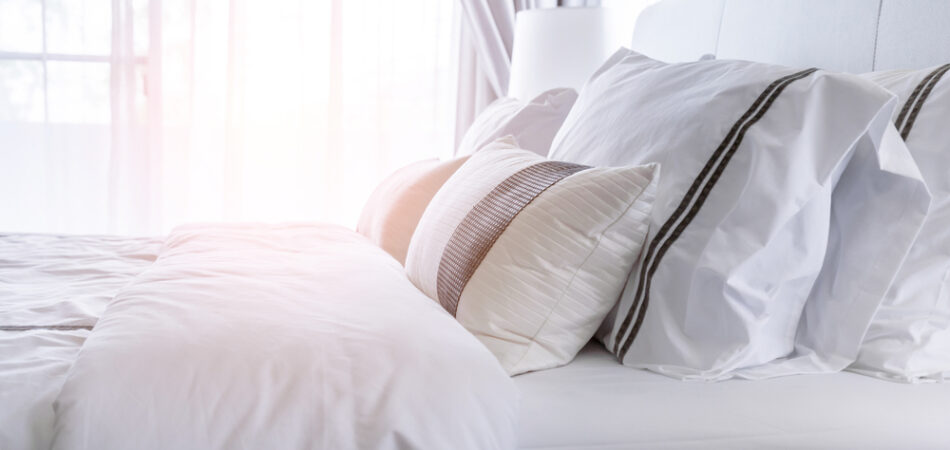
If you love your blankets but hate how they make your feet hurt when you sleep under them, you’re not alone—it’s a surprisingly common phenomenon. There are a few possible explanations for why this happens, and luckily, solutions are available.
In this article, we at KniseWorks look at why blankets may be hurting your feet and different things you can do to help bring some relief and alleviate the problem.
Why Do Blankets Hurt My Feet?
Many people love their blankets, but their feet can hurt when they sleep under them. This can be because blankets made of materials that do not “breathe,” such as wool or synthetic fibers, are heavy and compress the foot, cutting off circulation.
Additionally, sensory receptors in the feet may be more sensitive than in other parts of the body, making them more susceptible to pain from pressure or cold. People with diabetes or other conditions that cause nerve damage may be especially likely to experience pain from blankets.
A third explanation is that your body’s natural heat-regulating system can be disrupted. This occurs when your feet are covered and trapped by a blanket. With your feet pressed down and no air circulation, the foot’s ability to help thermoregulate effectively is inhibited which may further irritate your feet and cause a disruption in your sleep cycle.
What Can I Do if Blankets Hurt My Feet?
Whatever the cause, there are several foot pain solutions that can help mitigate the discomfort so you can enjoy snuggling up under a blanket again.
Lighter Weight Blankets
One solution is to choose a lighter-weight blanket made of natural fibers like cotton or linen. These materials “breathe,” so they won’t trap as much heat against your skin. You could also try using two thin blankets instead of one thick one—this way, you can adjust how much coverage you need without putting too much pressure on your feet.
Weighted Blankets
Another option is to use a weighted blanket. These blankets are designed to distribute weight evenly across your body, which helps alleviate pressure points. If you’re interested in using a weighted blanket, consult your doctor first, as there are varying weights, and it may not suit everyone.
Comfortable Bedding
Make sure you’re using a mattress and bedding that is comfortable for you. A firm mattress may not provide the right support for your feet, while an overly soft one could cause the blankets to bunch up around your feet. The right bedding can make a big difference in how comfortable you are at night.
Blanket Lifter
One solution that many find helpful is to use a blanket lifter. A blanket lifter goes under your sheets and blankets and lifts them off your feet and toes, so your feet can remain covered but not get cold and hurt. Many kinds of blanket lifters are available on the market, so you can choose the one that best fits your needs.
Some factors to consider when choosing a blanket lifter include the following:
The Size of the Device
Blanket lifters come in a variety of sizes. Choose a size that will fit under your blanket without being too bulky.
Lifting Capacity
Ensure the blanket lifter can lift your blanket high enough. Also, depending on the type of blanket lifter, you may need to check the thickness of your mattress for this one.
Material
Blanket lifters can be made of plastic, foam, or metal. Choose a material that you are most comfortable with possibly making contact with your skin and that won’t break easily.
The Price
Blanket lifters range in price from $20 to $200. Choose a price that you are comfortable with and that fits your budget, but remember that old adage, “you get what you pay for.”
How Do You Use a Blanket Lift?
Using a blanket lift can help distribute the weight of the blanket more evenly and prevent the blanket from irritating your skin and/or injury. It can also help keep your feet warm by preventing the blanket from disrupting your body’s natural heat regulation system.
How to use a blanket lift:
- Make sure the device is installed correctly.
- Drape the blanket over the top of the device to cover the surface evenly.
- Adjust the device’s height until the blanket is “taught” and there is no slack.
Following these steps can help prevent blankets from hurting your feet.
Do Bed Cradles Prevent Foot Drop?
Bed cradles, like Bed Sheet Lifters, can be used to address foot drops and other related issues. There are different types of bed cradles and bed sheet lifters, and they work in different ways. Some bed cradles are designed to keep the foot in a specific position, while others are meant to provide support and comfort. In some cases, bed cradles may be ineffective as it relates to foot drop, and other treatments may be necessary.
Supportive Bed Cradle
Supportive bed cradles, sometimes called pillow cradles or wedges, can be made of firm foam or other materials that provide support and comfort. The wedge is placed on the mattress at the end of the bed on both sides of the feet to help stabilize the foot.
Supportive Bed Cradles are not always effective in preventing foot drop. Sometimes, the cradle can become dislodged during sleep causing pain or discomfort. Additionally, they may not provide enough support for people with certain medical conditions, such as diabetes or nerve damage.
Conclusion
If you suffer from painful feet when you try to sleep, a dynamic portable bedsheet riser from Cozy Toezy will give you instant relief. Cozy Toezy has a bedsheet riser that will fit almost any bed or mattress to fit your needs. Contact us KniseWorks to today to learn more about their versatile blanket lifter and how they can help you relieve foot pain.

